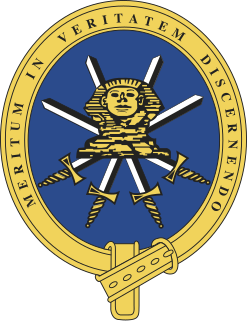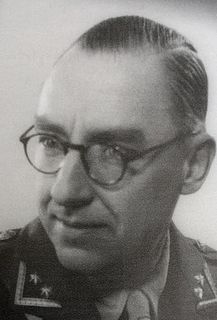
The Centrale Veiligheidsdienst (CVD) was a Dutch security agency founded in 1946 as the successor to the Bureau Nationale Veiligheid. It was transformed into the Binnenlandse Veiligheidsdienst in 1949.

The Centrale Veiligheidsdienst (CVD) was a Dutch security agency founded in 1946 as the successor to the Bureau Nationale Veiligheid. It was transformed into the Binnenlandse Veiligheidsdienst in 1949.
World War II had made it clear to the Dutch government how important a good intelligence service was, and wished to install a more general and permanent institution than the Bureau Nationale Veiligheid (BNV), whose primary mission had been to roll up remnants of German intelligence services, monitor former collaborators with the German regime, and track separatists in Dutch Indonesia. Louis Einthoven, head of the BNV, advised the government to model a security agency after the British MI5, meaning it would be responsible for gathering intelligence but have not the power to enforce laws, in order to prevent the agency from being a secret police like the German Gestapo. [1]
The CVD was founded with a (secret) Royal Decree on 9 April 1946, and Einthoven was its first director. It was run under the Ministry of General Affairs, headed by prime minister Louis Beel. [1]

The General Intelligence and Security Service is the intelligence and security agency of the Netherlands, tasked with domestic, foreign and signals intelligence and protecting national security.
A security agency is a governmental organization that conducts intelligence activities for the internal security of a nation. They are the domestic cousins of foreign intelligence agencies, and typically conduct counterintelligence to thwart other countries' foreign intelligence efforts. For example, the United States Federal Bureau of Investigation (FBI) is the internal intelligence, security and law enforcement agency, while the Central Intelligence Agency (CIA) is an external intelligence service, which deals primarily with intelligence collection overseas. A similar relationship exists in Britain between MI5 and MI6.

The Ministry of Public Security is a public agency directly under the Government of Vietnam, performing the function of state management of security, order and social safety; counterintelligence; crime prevention investigation; fire prevention and rescue; execution of criminal judgments, judgment enforcement not subject to imprisonment, custody or temporary detention; legal protection and support; State management of public services in sectors and fields under the Ministry's state management.
The Direction Centrale des Renseignements Généraux, often called Renseignements Généraux (RG), was the intelligence service of the French police, answerable to the Direction Générale de la Police Nationale (DGPN), and, ultimately, the Ministry of the Interior. It was also in charge of the monitoring of gambling places and horse racing ranges.

The State Security Service (VSSE) is a Belgian intelligence and security agency. Established in 1830, it is the oldest intelligence service except for the Vatican's. The State Security is a civilian agency under the authority of the Ministry of Justice, while the military intelligence agency, the General Information and Security Service, operates under the authority of the Ministry of Defense. The current Administrator-General is Jaak Raes, after his predecessor Alain Winants occupied the position between 2006 and 2014. The VSSE takes part in a number of international intelligence cooperative relationships, such as the Club de Berne and the CTG. It has contacts with over 90 sister services across four continents.

The General Intelligence and Security Service (GISS), known in Dutch as Algemene Dienst Inlichting en Veiligheid (ADIV), and in French as Service Général du Renseignement et de la Sécurité (SGRS) is the Belgian military intelligence service under responsibility of the Minister of Defence. It is one of two Belgian intelligence services, together with the civilian Belgian State Security Service (VSSE).

The Military Intelligence and Security Service is the military intelligence service of the Netherlands. It was formerly known as the Militaire Inlichtingendienst (MID) and received its current name in 2002. The MIVD is part of the Ministry of Defence.
The Deuxième Bureau de l'État-major général was France's external military intelligence agency from 1871 to 1940. It was dissolved together with the Third Republic upon the armistice with Germany. However the term "Deuxième Bureau", like "MI5", "CIA" and "SMERSH"/"KGB", outlived the original organization as a general label for the country's intelligence service.
BVD and similar can mean:

Jacobus Smede "Koos" Sinninghe Damsté (1902–1995) was a lawyer in colonial Indonesia during 1927–1942, prosecutor of Japanese war criminals during 1946–1947, chairman of the national business association in Indonesia during 1948–1954, and head of the Netherlands Security Service during 1955–1967.

Hendrikus Wilhelmus Maria "Dick" Schoof is a Dutch civil servant. He is director-general at the General Intelligence and Security Service of the Netherlands since November 2018, and has been announced as the new secretary-general at the Ministry of Justice and Security per 1 March 2020.

Louis Einthoven was a Dutch lawyer and the co-founder of Nederlandsche Unie. After the war, Einthoven was put in charge of Bureau Nationale Veiligheid, which was renamed Binnenlandse Veiligheidsdienst. He was born in Soerabaja and died in Lunteren.

Wim Sanders was a Dutch politician and World War II resistance fighter.
The Bureau Nationale Veiligheid (BNV) was a Dutch security agency that was founded in 1945 and succeeded in 1946 by the Centrale Veiligheidsdienst, which in turn was transformed into the Binnenlandse Veiligheidsdienst (BVD) in 1949.